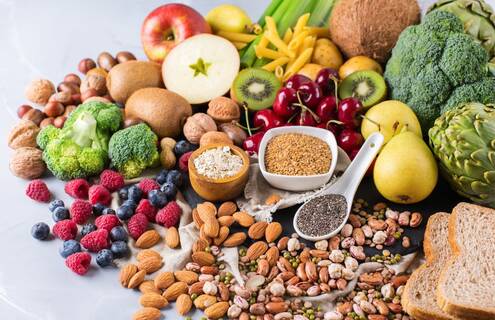
In the Dietary Guidelines for Americans’ newest edition, the word “fiber” is mentioned 33 times and identified as a “dietary component of public health concern.”
So, why all the fuss over fiber?
Despite so many fiber-filled foods being absolutely delicious, the most recent data shows the average American is only eating about 16 grams of fiber per day—far below current recommendations—which has serious negative health implications.
The following recommendations were adapted from the recent guidelines:
|
Age 19-30 years |
Females 28 grams per day |
Males 34 grams per day |
|
Age 31-50 years |
Females 25 grams per day |
Males 31 grams per day |
|
Age 51+ years |
Females 22 grams per day |
Males 28 grams per day |
What is dietary fiber?
As a non-digestible carbohydrate, it is the portion of plant-based foods that can’t be broken down by our body’s digestive system. That means it stays mainly intact in its journey through our body. Dietary fibers are sometimes referred to as “roughage” or “bulk” and can be broken up into two groups:
Soluble fibers: These have the ability to partially absorb water and create a viscous gel.
Insoluble fibers: These do not absorb fluids and help increase the bulk of stools.
Fiber has many other health benefits. Today, we’ll focus on fiber’s role in weight management, gut health, heart health, and blood sugar maintenance.
How does eating fiber help me manage my weight?
Fiber’s ability to absorb fluids and create bulk helps you feel full during meal times and sometimes long after. It helps us eat less by stretching the stomach, which prompts the release of fullness hormones that tell the brain it is satisfied from a meal. Many high-fiber foods, such as non-starchy vegetables, are typically high in nutrients and low in calories too. That makes them valuable foods for meals or snacks—one cup of most leafy greens will provide roughly 4 grams of filling fiber.
How does fiber improve my gut health?
Eating more dietary fiber can help increase the bulk of bowel movements and keep the lining of our intestines cleaned out. More fiber in your day-to-day diet can result in:
- Improved regularity.
- Fewer instances of constipation, diarrhea, and bloating.
- Fewer flares of diverticulitis.
Eating a wide range of foods with both soluble and insoluble fiber can help beneficial gut bacteria thrive. Fiber is often a good starting place for people struggling with gastrointestinal issues.
How does fiber help my heart?
Eating more fiber can help lower cholesterol levels in the blood, which can help lower your risk for both heart attack and stroke. The claim that whole grains like oatmeal can help naturally reduce cholesterol is true. Fibers in the oatmeal bind with cholesterol in the gut and help it pass out of the body without absorbing into the bloodstream.
How does fiber benefit my blood sugar?
High-fiber foods help stabilize blood sugars by slowing the digestion and absorption of foods in your stomach. Additionally, fiber is a non-digestible carbohydrate, so you can subtract it from total carbohydrates if you are watching your blood sugar levels—often referred to as “net carbohydrate.”
Which foods should I eat for more fiber?
These food groups include some abundant sources of dietary fiber:
- Vegetables: greens (spinach, collard, kale), squash, broccoli, potatoes, beets, and carrots.
- Fruits: berries, apples (with skin), pears, bananas, and citrus.
- Whole grains: whole wheat bread, oatmeal, brown rice, and quinoa.
- Legumes: starchy beans (kidney, black, pinto, garbanzo), lentils, and split peas.
- Nuts: almonds, walnuts, cashews, hazelnuts and pistachio.
- Seeds: chia, flax, sunflower, pecans, peanuts, squash and pumpkin.
Now you know some benefits of eating more fiber and which foods supply it, simply add more of these plant-based foods to all meals!
Registered dietitians (RDs) understand just how hard achieving nutrition goals like increasing fiber can be and are specifically trained to help. If you are struggling with your eating habits, ask your physician for a referral to meet with one of Cheshire’s friendly and knowledgeable outpatient dietitians today!